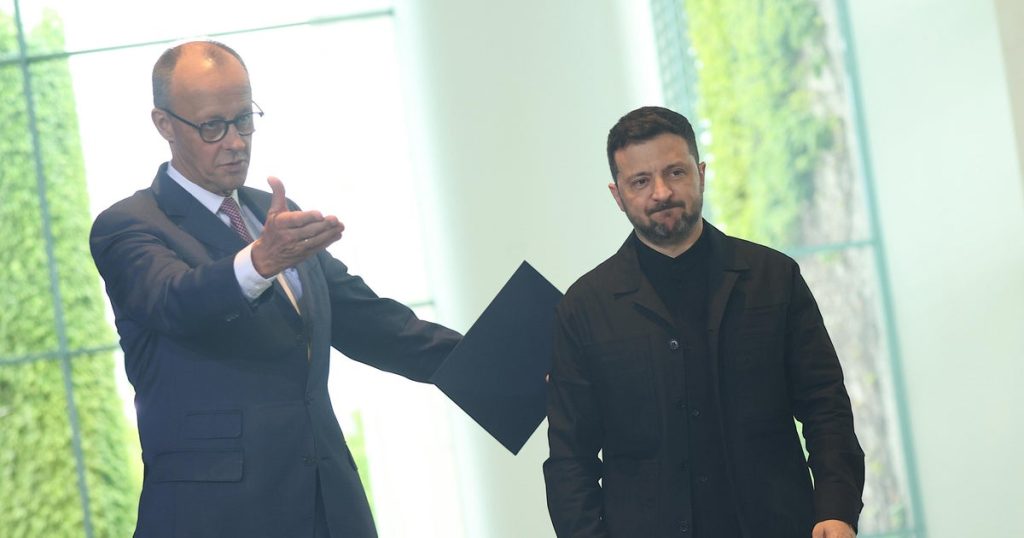During a recent visit to Berlin, Ukrainian President Volodymyr Zelenskyy engaged in discussions with German Chancellor Friedrich Merz, focusing on bolstering Ukraine’s military capabilities. The duo announced plans for Germany to support Ukraine in the development of long-range weaponry capable of targeting Russian territory. This strategic move comes in light of intensified Russian missile and drone assaults on Ukraine, highlighting the ongoing conflict and the need for robust defense strategies.
| Article Subheadings |
|---|
| 1) New Defense Initiatives Between Germany and Ukraine |
| 2) UN Report Condemns Russian Attacks |
| 3) Germany’s Stance on Military Support |
| 4) Responses from Russia |
| 5) Reactions from Global Leaders |
New Defense Initiatives Between Germany and Ukraine
The recent meeting between Chancellor Merz and President Zelenskyy set the stage for crucial developments in military cooperation between Germany and Ukraine. Announced during a joint press conference, the leaders revealed plans for a memorandum aimed at creating new long-range weapons systems. These initiatives are intended to bolster Ukraine’s defense capabilities by enabling it to strike targets deep within Russian territory, thus enhancing its operational flexibility. This arms support, as emphasized by Merz, is vital for allowing Ukraine to defend itself more effectively and is seen as critical amid a backdrop of escalating military engagement.
UN Report Condemns Russian Attacks
Recent statements from the United Nations have reinforced the urgent call for accountability regarding Russian military actions. A report by the Independent International Commission of Inquiry on Ukraine categorically stated that Russian forces have engaged in “crimes against humanity” and “war crimes” through deliberate strikes on civilians. This condemnation centers particularly on the Kherson region, where drone attacks have targeted civilian infrastructure, instilling fear and terror among the populace. The report indicates a systematic pattern of aggression and emphasizes the need for an international response to ensure humanitarian law is upheld.
Germany’s Stance on Military Support
Chancellor Merz has made it abundantly clear that the recent agreements regarding military support for Ukraine reflect a shift in Germany’s foreign policy stance. Emphasizing a new era of cooperation between the two nations, his comments indicate a commitment to enhancing military capabilities without imposing restrictions on the types or ranges of weapons supplied. Underlining the absence of range limitations, he pointed out that Ukraine would now have the capacity to target military positions in Russia. This development signals Germany’s readiness to confront aggression with substantial military backing, a move previously considered politically sensitive.
Responses from Russia
In the wake of Germany’s announcements, Russian officials have articulated vehement opposition to any Western support for Ukraine. Sergey Lavrov, Russia’s Foreign Minister, criticized the German-Ukrainian collaboration as an act that would escalate tensions in Europe. He warned that this partnership effectively pulls Germany directly into the conflict, implying that such alignment could have serious geopolitical repercussions. Lavrov’s comments reflect a broader sentiment in Moscow, where Russian leadership perceives increased NATO engagement as a threat to national security.
Reactions from Global Leaders
The atmosphere surrounding the Ukraine conflict continues to garner reactions from international leaders. Notably, President Trump expressed concern over Putin’s decision-making, labeling him as “crazy” in a recent social media post. While Trump has maintained a complex relationship with Russia, his recent remarks suggest heightened alarm over the ongoing war. Meanwhile, Kremlin officials have downplayed his assessments, attributing them to a lack of information on the situation in Ukraine. This dialogue between leaders illustrates the complexities and increasing stakes of foreign policy decisions tied to the Ukraine crisis.
| No. | Key Points |
|---|---|
| 1 | Germany will support Ukraine in developing long-range weapon systems. |
| 2 | The UN has condemned Russian military actions as crimes against humanity. |
| 3 | Chancellor Merz emphasizes no limitations on weapon ranges for Ukraine. |
| 4 | Russia threatens escalation of conflict in response to NATO support. |
| 5 | Global leaders express varied reactions, indicating the conflict’s international implications. |
Summary
The recent discussions between Germany and Ukraine illuminate a pivotal moment in military cooperation against Russian aggression. With the announcement of new long-range weapon systems and Germany’s commitment to support Ukraine, the international community is witnessing a significant shift in how European nations approach defense and security in light of ongoing conflict. The response from Russia and international leaders underscores the potential for increased geopolitical tensions as countries navigate complex and evolving international relations.
Frequently Asked Questions
Question: What are the implications of Germany supplying long-range weapons to Ukraine?
Supplying long-range weapons could significantly enhance Ukraine’s military capabilities, enabling it to conduct operations deeper into Russian territory, ultimately changing the dynamics of the ongoing conflict.
Question: What did the UN report say about Russian military actions?
The UN report unequivocally stated that Russian forces have committed crimes against humanity, particularly through attacks on civilians and civilian infrastructure in Ukraine.
Question: How have international leaders reacted to the conflict?
International reactions vary widely, from strong support for Ukraine and criticism of Russia to calls for caution and dialogue, indicating the complexity and stakes involved in the ongoing conflict.


